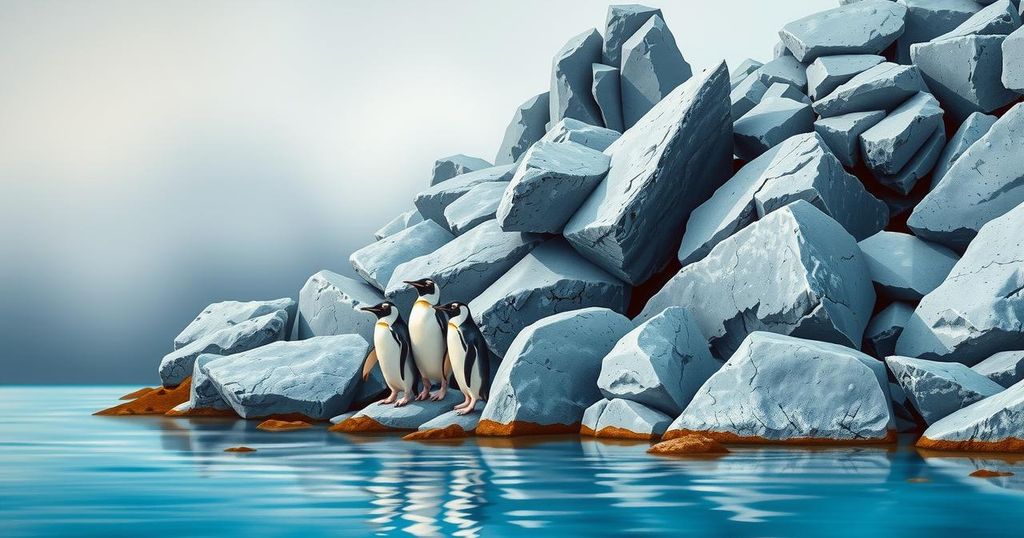Economic and Environmental Value of South Africa’s African Penguins

The African Penguin population in South Africa, critically endangered, is valued between R2 billion and R4.5 billion, with significant tourism potential. A report highlights the economic and environmental trade-offs, stressing the need for effective conservation strategies amidst pressures from fishing industries. Recent legal settlements may enhance protections for these penguins, crucial for preserving both their habitat and South Africa’s environmental reputation.
The critical status of South Africa’s African Penguins has sparked a debate balancing environmental conservation and economic interests. The pelagic fishing industry, which generates approximately R5.5 billion and supports around 5,100 jobs, opposes expanding no-fishing zones around penguin colonies. Conversely, a report by Anchor Environmental Consultants values these colonies between R2 billion and R4.5 billion, linking 1,046 to 4,611 jobs to their conservation and tourism potential.
The report evaluates factors such as tourism revenue, education, and media impact, highlighting the thriving tourism associated with penguin colonies. Interviews and data on visitor spending patterns were utilized, revealing the economic value these colonies hold. The African Penguin, listed as critically endangered in October of the previous year, faces potential extinction within a decade without effective protective measures.
Commissioned by the Endangered Wildlife Trust, the report authored by Johanna Brühl and Jane Turpie underscores that losing African Penguins would harm South Africa’s global reputation as a steward of environmental assets. The extinction of this species could damage South Africa’s brand image as a destination renowned for its natural beauty and biodiversity.
The report emphasizes that successful conservation efforts must extend beyond merely closing islands to include enhanced ocean health management. This approach must account for the intricate ecosystems involved to prevent unforeseen ecological repercussions tied to the potential extinction of African Penguins.
Despite recent tourism benefits largely arising from the mainland colonies at Simon’s Town and Betty’s Bay, there remains considerable unrealized tourism potential at Bird Island. Evidence indicates that the Simon’s Town colony’s visitor numbers tripled between 1995 and 2019, demonstrating the significant value penguins bring to South Africa, especially as international tourism increases.
The dramatic decline from approximately 300,000 African Penguins in the 1950s to merely 8,324 breeding pairs today is due to several factors, including human interference from oil spills and fishing competition. Climate change further exacerbates these challenges, impacting prey availability and ultimately penguin survivorship.
Efforts to establish no-fishing zones initiated in 2008 have thus far failed to reverse population declines. Recent deterioration, particularly in the Eastern Cape, has raised concerns regarding increased shipping activity impacting penguin foraging. While a temporary halt to oil transfer operations saw a resurgence in penguin numbers at St. Croix Island, renewed activity raises uncertainties.
Recent legal actions have aimed to expand no-take zones around penguin islands, culminating in a settlement that proposes closures based on expert recommendations. The impact of these zones on penguin recovery remains to be seen, yet Pichegru asserts these closures could significantly enhance penguin survival prospects.
This article originally published on GroundUp reports on the ongoing challenges and potential pathways for the preservation of the African Penguin population in South Africa.
In summary, the African Penguins of South Africa face critical challenges that require balancing economic and environmental interests. The significant economic contributions derived from both the pelagic fishing industry and tourism linked to penguin colonies illustrate the complexity of conservation efforts. The recent report suggests that urgent protective measures are necessary to preserve these penguins, not only for their ecological value but also for the reputation of South Africa as a leader in environmental stewardship. Effective management and innovative conservation strategies are paramount to ensure the survival of this iconic species.
Original Source: www.bizcommunity.com








